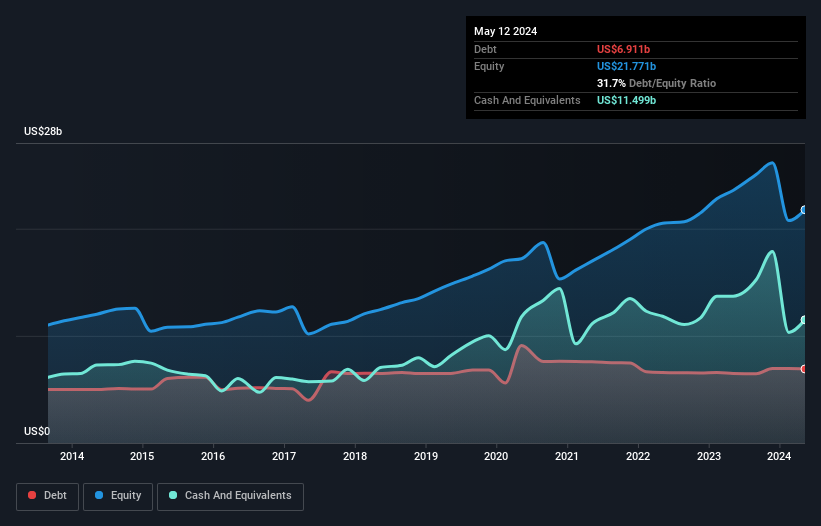- United States
- /
- Food and Staples Retail
- /
- NasdaqGS:COST
Is Costco Wholesale (NASDAQ:COST) A Risky Investment?

Some say volatility, rather than debt, is the best way to think about risk as an investor, but Warren Buffett famously said that 'Volatility is far from synonymous with risk.' So it seems the smart money knows that debt - which is usually involved in bankruptcies - is a very important factor, when you assess how risky a company is. Importantly, Costco Wholesale Corporation (NASDAQ:COST) does carry debt. But should shareholders be worried about its use of debt?
When Is Debt A Problem?
Debt assists a business until the business has trouble paying it off, either with new capital or with free cash flow. Part and parcel of capitalism is the process of 'creative destruction' where failed businesses are mercilessly liquidated by their bankers. However, a more frequent (but still costly) occurrence is where a company must issue shares at bargain-basement prices, permanently diluting shareholders, just to shore up its balance sheet. Of course, debt can be an important tool in businesses, particularly capital heavy businesses. When we examine debt levels, we first consider both cash and debt levels, together.
View our latest analysis for Costco Wholesale
How Much Debt Does Costco Wholesale Carry?
The image below, which you can click on for greater detail, shows that at May 2024 Costco Wholesale had debt of US$6.91b, up from US$6.50b in one year. But on the other hand it also has US$11.5b in cash, leading to a US$4.59b net cash position.

How Healthy Is Costco Wholesale's Balance Sheet?
Zooming in on the latest balance sheet data, we can see that Costco Wholesale had liabilities of US$35.4b due within 12 months and liabilities of US$10.8b due beyond that. Offsetting these obligations, it had cash of US$11.5b as well as receivables valued at US$2.58b due within 12 months. So its liabilities total US$32.1b more than the combination of its cash and short-term receivables.
Since publicly traded Costco Wholesale shares are worth a very impressive total of US$362.5b, it seems unlikely that this level of liabilities would be a major threat. But there are sufficient liabilities that we would certainly recommend shareholders continue to monitor the balance sheet, going forward. Despite its noteworthy liabilities, Costco Wholesale boasts net cash, so it's fair to say it does not have a heavy debt load!
Fortunately, Costco Wholesale grew its EBIT by 8.1% in the last year, making that debt load look even more manageable. When analysing debt levels, the balance sheet is the obvious place to start. But ultimately the future profitability of the business will decide if Costco Wholesale can strengthen its balance sheet over time. So if you're focused on the future you can check out this free report showing analyst profit forecasts.
Finally, while the tax-man may adore accounting profits, lenders only accept cold hard cash. While Costco Wholesale has net cash on its balance sheet, it's still worth taking a look at its ability to convert earnings before interest and tax (EBIT) to free cash flow, to help us understand how quickly it is building (or eroding) that cash balance. Over the most recent three years, Costco Wholesale recorded free cash flow worth 68% of its EBIT, which is around normal, given free cash flow excludes interest and tax. This cold hard cash means it can reduce its debt when it wants to.
Summing Up
We could understand if investors are concerned about Costco Wholesale's liabilities, but we can be reassured by the fact it has has net cash of US$4.59b. And it impressed us with free cash flow of US$7.4b, being 68% of its EBIT. So we don't think Costco Wholesale's use of debt is risky. There's no doubt that we learn most about debt from the balance sheet. But ultimately, every company can contain risks that exist outside of the balance sheet. These risks can be hard to spot. Every company has them, and we've spotted 1 warning sign for Costco Wholesale you should know about.
When all is said and done, sometimes its easier to focus on companies that don't even need debt. Readers can access a list of growth stocks with zero net debt 100% free, right now.
New: AI Stock Screener & Alerts
Our new AI Stock Screener scans the market every day to uncover opportunities.
• Dividend Powerhouses (3%+ Yield)
• Undervalued Small Caps with Insider Buying
• High growth Tech and AI Companies
Or build your own from over 50 metrics.
Have feedback on this article? Concerned about the content? Get in touch with us directly. Alternatively, email editorial-team (at) simplywallst.com.
This article by Simply Wall St is general in nature. We provide commentary based on historical data and analyst forecasts only using an unbiased methodology and our articles are not intended to be financial advice. It does not constitute a recommendation to buy or sell any stock, and does not take account of your objectives, or your financial situation. We aim to bring you long-term focused analysis driven by fundamental data. Note that our analysis may not factor in the latest price-sensitive company announcements or qualitative material. Simply Wall St has no position in any stocks mentioned.
Have feedback on this article? Concerned about the content? Get in touch with us directly. Alternatively, email editorial-team@simplywallst.com
About NasdaqGS:COST
Costco Wholesale
Engages in the operation of membership warehouses in the United States, Puerto Rico, Canada, Mexico, Japan, the United Kingdom, Korea, Australia, Taiwan, China, Spain, France, Iceland, New Zealand, and Sweden.
Solid track record with excellent balance sheet.
Similar Companies
Market Insights
Community Narratives



